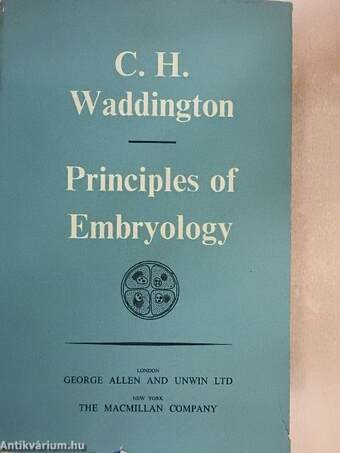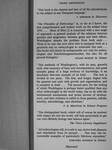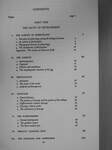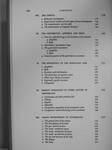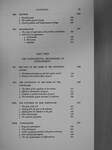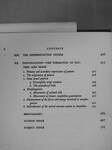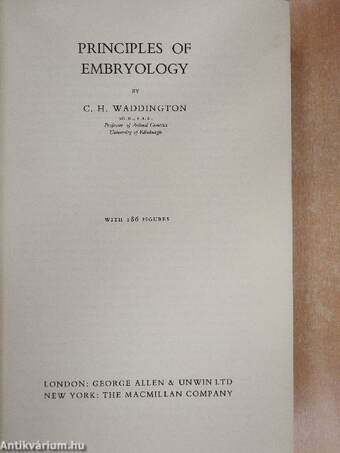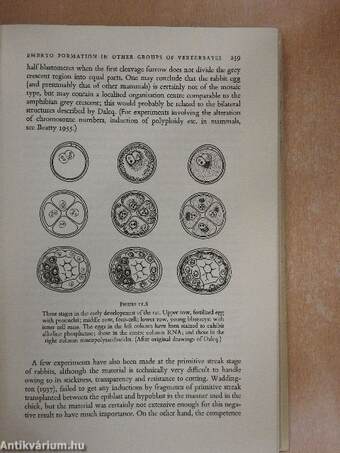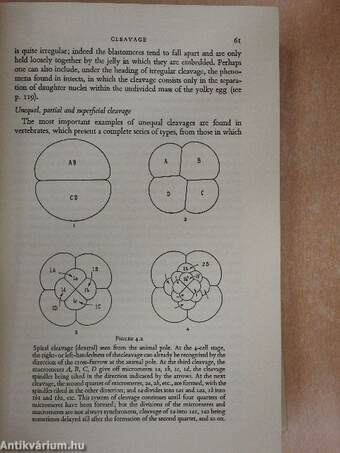1.063.486
kiadvánnyal nyújtjuk Magyarország legnagyobb antikvár könyv-kínálatát

VISSZA
A TETEJÉRE
JAVASLATOKÉszre-
vételek
Principles of embryology
| Kiadó: | George Allen & Unwin Ltd-The Macmillan Company |
|---|---|
| Kiadás helye: | London-New York |
| Kiadás éve: | |
| Kötés típusa: | Vászon |
| Oldalszám: | 510 oldal |
| Sorozatcím: | |
| Kötetszám: | |
| Nyelv: | Angol |
| Méret: | 24 cm x 16 cm |
| ISBN: | |
| Megjegyzés: | Fekete-fehér illusztrációkkal. |
naponta értesítjük a beérkező friss
kiadványokról
naponta értesítjük a beérkező friss
kiadványokról
Fülszöveg
third impression
' This book is the clearest and best of all the introductions to the subject in any European language.'
j. needham in Discovery
' The Principles of Embryology' is, so far as I know, the first comprehensive and unitary work on the subject since 1934 . . . Most of (Part 2) is concerned with a new angle of approach—a general analysis of the relations between genetics and epigenetics, between genes and their effects. Waddington attacks the problem from both ends . . . There is no one else now alive who is equipped both as a geneticist and an embryologist to undertake this task . . . (the book) will clearly be indispensable not only for embry-ologists and Entwicklungsmechaniker, but also for all general biologists.' julian huxley in Nature
' This textbook of Waddington's, with its easy, graceful style, wise economy of facts and documentation, and great synoptic grasp of a huge territory of knowledge, is an absolutely first-rate example of its kind . . . The text is... Tovább
Fülszöveg
third impression
' This book is the clearest and best of all the introductions to the subject in any European language.'
j. needham in Discovery
' The Principles of Embryology' is, so far as I know, the first comprehensive and unitary work on the subject since 1934 . . . Most of (Part 2) is concerned with a new angle of approach—a general analysis of the relations between genetics and epigenetics, between genes and their effects. Waddington attacks the problem from both ends . . . There is no one else now alive who is equipped both as a geneticist and an embryologist to undertake this task . . . (the book) will clearly be indispensable not only for embry-ologists and Entwicklungsmechaniker, but also for all general biologists.' julian huxley in Nature
' This textbook of Waddington's, with its easy, graceful style, wise economy of facts and documentation, and great synoptic grasp of a huge territory of knowledge, is an absolutely first-rate example of its kind . . . The text is divided in two parts. The first, and longer, begins with the gametes and ends with growth and regeneration, and is complete in itself. . . The second part, for the writing of which Waddington is perhaps better qualified than any other embryologist in the world today, has to do with the fundamental mechanisms and prime movers of development, and here evidence is called in from genetics, cellular heredity, microbiology, and elsewhere.'
p. b. medawar in Science Progress
' This distinguished book, which will of course be received with respect all over the world, will help particularly to get our own (British) biology into balance again.'
The Times Literary Supplement
' All embryologists will, it is safe to say, derive both pleasure and stimulation from its perusal. . . One may cite innumerable examples of particularly felicitous exposition.'
Dorothea rudnick in Science
Illustrated Vissza
Témakörök
- Idegennyelv > Idegennyelvű könyvek > Angol > Egyéb
- Idegennyelv > Idegennyelvű könyvek > Angol > Természettudományok > Biológia
- Természettudomány > Biológia > Biológia, általános > Sejtbiológia
- Természettudomány > Biológia > Biológia, általános > Genetika
- Természettudomány > Biológia > Biológia, általános > Tankönyv > Felsőoktatás
- Természettudomány > Biológia > Biológia, általános > Idegennyelvű
- Tankönyvek, jegyzetek, szöveggyűjtemények > Természettudományok > Biológia > Felsőoktatási
C. H. Waddington
C. H. Waddington műveinek az Antikvarium.hu-n kapható vagy előjegyezhető listáját itt tekintheti meg: C. H. Waddington könyvek, művekMegvásárolható példányok
Nincs megvásárolható példány
A könyv összes megrendelhető példánya elfogyott. Ha kívánja, előjegyezheti a könyvet, és amint a könyv egy újabb példánya elérhető lesz, értesítjük.



